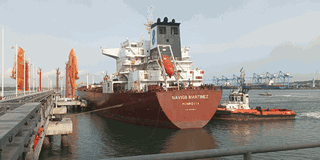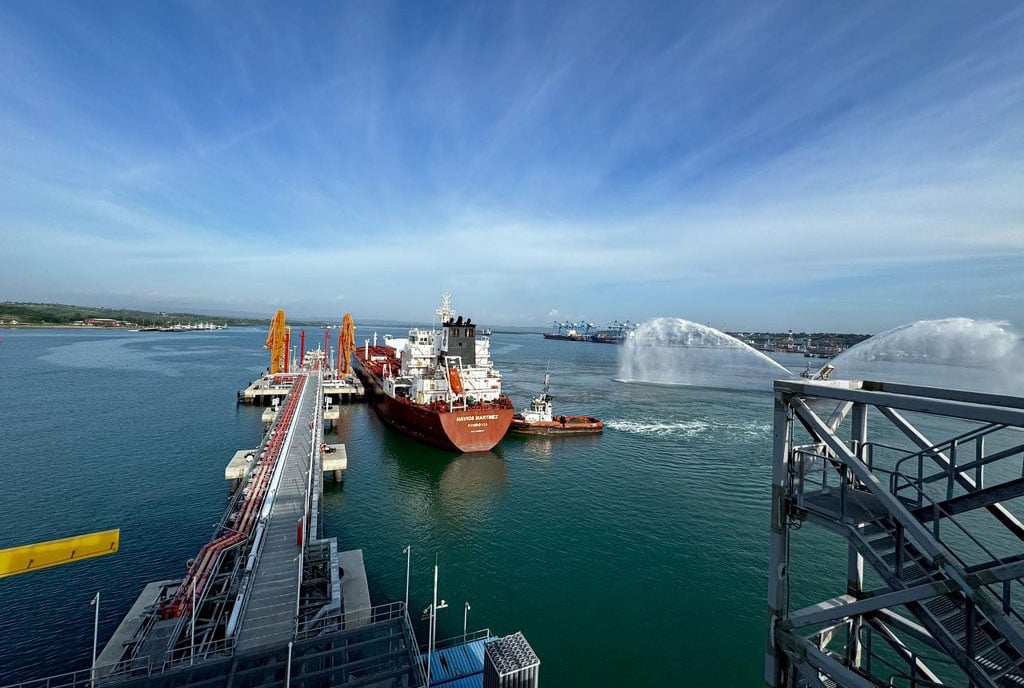
MT Navig8 Matines docks at the new Kipevu Oil Terminal 2 at the port of Mombasa on July 3. Uganda National Oil Company is now the sole importer after the deal that eliminated Kenyan companies and promises consistent supply and moderate fuel prices. PHOTO/ BETTY NDAGIRE
Middlemen who, until last week, were in charge of Uganda’s importation of petroleum products, have now been eliminated from the chain, paving the way for reduced pump prices across the country.
With the elimination of mostly Kenyan-based middlemen from the fuel importation process, Ugandan consumers will not have to shoulder the costs associated with intermediaries in the supply chain.
Before that, the middleman would factor in profit margins without considering the impact on the final consumers or the economy.
By the close of last week two separate shipments, the first 80 million litres of petrol and another 90 million litres of diesel docked at Mombasa port in Kenya.
After a protracted battle, Uganda National Oil Company (UNOC) now has the power to monopolise the supply of all petroleum products in Uganda after being armed with the Petroleum Supply Amendment Act 2023.
Vitol, a Swiss-based Dutch multinational energy and commodity trading company, will outsource oil products worth $250m (Shs923 billion) every month for Uganda, bypassing middlemen whom President Museveni describes as exploitative.

Energy Minister Ruth Nankabirwa (2nd left)chats with Kenya Ports Authority managing director Capt. William Ruto (2nd right) during the arrival of Uganda’s first consignment of imported petroleum products, sourced directly by the Uganda National Oil Company last week. PHOTO/ Betty Ndagire
Presidential battle
Surprised by the exploitative nature of middlemen, President Museveni following cries over the exorbitant cost of pump prices took on the battle to rescue the population from the fangs of the middlemen involved in the fuel importation business.
President Museveni believed Uganda’s economy wasn’t being protected from fuel cartels. These cartels frequently manipulate pricing, which dealers promptly transfer to the final consumer at the pump.
President Museveni then directed UNOC to take over the operation and directly deal with the supplier of the petroleum products and then distribute them to oil marketing companies (OMCs).
The President argues that by buying petroleum products from Kenya, middlemen were inflating the prices by up to nearly 60 per cent.
On average, Uganda imports about 2.5 billion litres of petroleum annually valued at $2 billion, but according to Mr Museveni, a substantial portion of this bill is inflated fees, thanks to the middlemen.
After his investigation, President Museveni disclosed that a tonne of diesel to Uganda was exaggerated to $118 compared to $83 from bulk suppliers—an equivalent of 42.1 per cent difference.
For petrol products, middlemen offered Uganda $97.5 (Shs2360,000) per tonne compared to $61.5 (Shs227,000) by bulk suppliers and refineries—indicating an extra 58.53 per cent to the middlemen.
The same trick from middlemen was evident in kerosene, a commodity used by the majority poor.
The new arrangement, which started with delivery of petroleum products last week, will see UNOC purchase the country’s entire fuel stock from Vitol Bahrain E.C before distributing it to Oil Marketing Companies (OMCs) in the country.
To reduce or not to reduce pump price?
According to the Energy Minister, Ruth Nankabirwa, fuel importation is expected to relieve Ugandans from the high pump price now in the range of ShsShs5,530 per litre of petrol and Shs5,150 per litre of diesel.
But, this will not be immediate because fuel prices at the pump are determined by market forces of demand and supply.
“The priority will continue to be security of supply and quality. Then the capacity of UNOC in their new mandate, because we want them to do it well,” Ms Nankabirwa said while receiving the first direct fuel consignment in Mombasa last week.
She continued: “On affordability of products, given that UNOC is in handling logistical costs, prices are expected to go down. UNOC will ensure that consumers are not taken advantage of by those who have been in the business.”
Uganda largely imports its petroleum products, with over 90 per cent through Mombasa port, supplemented by imports via Dar-es-Salaam port.
Last year, Uganda’s petroleum consumption reached a staggering 2.5 billion litres, incurring a $2 billion expense. With the 7 per cent annual growth in demand, efforts to increase security and efficiency of the supply of petroleum products are important, explaining the amendment of the Petroleum Supply Act of 2008 to empower UNOC in partnership with VITOL Energy Limited to import petroleum products directly from the refineries overseas.
But this didn’t come without a fight. UNOC was set to commence the importation in January 2024 but due to a court suit challenging UNOC’s application for a licence to purchase and handle fuel products in Kenya, this was not achieved. Uganda’s government escalated the dispute to the East Africa Court of Justice (EACJ) where a ruling was expected.
The final ruling of the Court case in Machakos, Kenya was expected on January 22, 2024 but was deferred to February 12, 2024. Finally, it was in favour of Uganda.
Analysts show their hand
This development deals a heavy blow to Kenya’s OMCs which have been supplying up to 90 per cent to Uganda through their associates-middlemen. The transit fuel has also been a critical source of US dollars for OMCs, which allowed them to better handle the dollar shortage that would hit Kenya in recent years.
Additionally, Uganda has bypassed Kenya and chose Tanzania to host buffer fuel stocks on its behalf to ensure stable supply in case of market disruptions and in cases of interruption that could impact the movement of cargo as seen in the wake of Gen Z protests rocking Kenya in the past few weeks.
In an interview with Mr Peter Onasis Ochieng, an oil industry expert, Uganda’s decision to import its petroleum products directly from suppliers is a good move as far as shielding the consumers from high pump prices resulting from the margins inflated by the middlemen in the supply chain.
“Uganda will have more control of supply instead of relying on a third party – Kenya. And importantly, there will be better margins to work with, given that Uganda will be buying directly from the source, resulting in lower pump prices to Ugandan consumers.”
But there are risks as well. According to Mr Ochieng, UNOC will have to quickly learn or work with experienced negotiators in influencing prices and in some cases, pushing it even further in favour of Uganda.
“Government and government bodies have proven from history to be very poor in procurement. If UNOC does not get procurement right, the long-term benefits of having competitive or better prices with the pulse of the world market trends will fail,” says Mr Ochieng.
He continued: “One tool they can use is to call for monthly tender for the procurement or supply of product. We have many reputable traders in the world. Single sourcing will not be fruitful or sustainable in terms of good pricing in the long run if they continue to single source from Vitol.”
Reprieve
When contacted, Mr Brian Sserunjogi, a research fellow at the Economic Policy Research Centre (EPRC), it emerged that the reprieve that final consumers resulting from the inflated cost due to the middlemen, is only a temporary measure rather than a long-term solution for the high cost of the pump price.
According to the EPRC researcher, marketing and transactional costs are a small part of the problem compared to the real issue which is the price determined by international producers such as the Organization of the Petroleum Exporting Countries (OPEC).
According to the EPRC report, international fuel price (crude oil) always emerges as the most significant driver of Uganda’s fuel pump price, comprising not less than 40 per cent of the pump price. This is followed by tax which contributes about 31 per cent and then distribution and marketing costs as well as retail dealer profit margin making up 29 per cent of the pump price you pay.
The report further states that on average, for every dollar increase in global fuel price, there is a likelihood that about 2 dollars are passed through to the pump price. This is further exacerbated by fuel shortages, weak fuel reserve capacity and the tendency of an oligopolistic cartel-like structure of the petroleum market – all seemingly amplifying the fuel price crisis.
And for that, the report concludes that domestic policy actions can influence tax-related costs, distribution, and profit margin rather than the international crude oil price.
Industry players and customised fuel
Some of the leading industry dealers like Shell, referred Prosper Magazine to the Ministry of Energy and UNOC spokesperson when asked about the impact of this development on their customised fuel products and operations in general. While Total, by press time had not responded to Prosper Magazine.
However, when asked, about the implications of importing oil directly from the supplier on the industry players, some of whom like Shell and Total sell customised fuel, the Commissioner for Petroleum Supply at the Ministry of Energy and Mineral Development, Reverend Frank Tukwasibwe, said: “On the impact, it appears to be more hypothetical than the reality.
“The mentioned companies and some others sell but do not import customised fuel, that is, fuel with additives. As such, bulk importation of fuel is distinct from customising fuel by individual companies. There is, therefore, no impact.”




